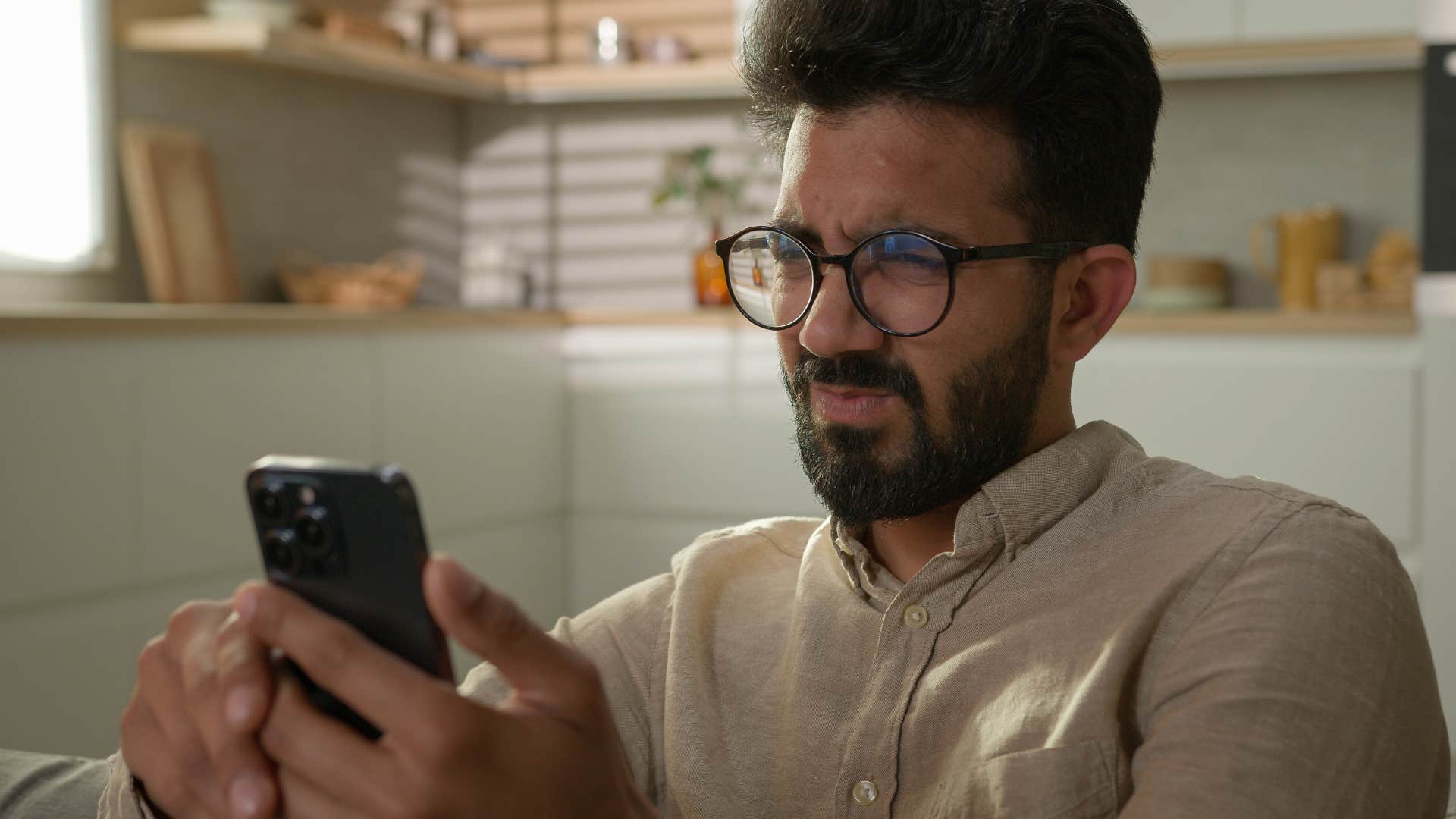Posting These 11 Things On Social Media Makes Someone Look Low-Value Without Them Even Realizing
A reminder to be intentional about how you share your world online.
 Ilona Kozhevnikova | Shutterstock
Ilona Kozhevnikova | Shutterstock While it’s true that social media can often be used to boost mental health, cultivate personal identity, and form healthy communities, the way people decide to interact and post online plays a huge role in whether or not they’re actually reaping those benefits. From interacting with strangers they don’t know to making content on their personal platforms, posting certain things on social media makes someone look low-value without them even realizing it.
Even if they’re just oversharing about their lives and getting a tad bit too personal with strangers they don’t know behind a screen, these simple, seemingly harmless behaviors can do a lot of damage to a person’s reputation. Be intentional and careful about how you post, especially to strangers who don’t know your character or personality at all.
Posting these 11 things on social media makes someone look low-value without them even realizing it
1. Rudeness or shade
 MAYA LAB | Shutterstock
MAYA LAB | Shutterstock
Posting rude comments or shading people often on social media often makes someone look low-value without them even realizing it. They might feel like they’re hidden from the backlash of cruelty or protected from any social consequences by being mean from behind a screen, but that couldn’t be farther from the truth. People are always watching.
In general, experts suggest that social media is making us ruder, with a lack of nonverbal cues and a shield of anonymity, but that doesn’t mean that being cruel and unkind online isn’t negatively affecting your reputation and social perception.
2. Cryptic messages like ‘you know who you are’
 MAYA LAB | Shutterstock
MAYA LAB | Shutterstock
If you’re always “sub-tweeting” about fake friends and calling out a partner on social media instead of addressing and working through these problems offline, people probably perceive you to be a low-value person who lacks emotional intelligence.
Whether it’s fearing the confrontation of addressing their concerns in face-to-face or simply wanting the attention and validation from people online that comes from vague cryptic messages, you’re only harming your reputation and relationships by leaning on social media for attention.
3. Videos with a fake voice
 AlessandroBiascioli | Shutterstock
AlessandroBiascioli | Shutterstock
We’re all yearning for a kind of authenticity and real connection, whether that’s in-person with the people around us or on social media. So, it’s no surprise that quick reveals of fakeness or ingenuity, like changing your voice for social media, are things that immediately make someone look low-value without them even realizing it.
Like psychologist Rick Hanson suggests, our brains are more sensitive to changes in the tone of someone’s voice than we realize. Of course, we can use this to our advantage, but when it’s clear someone’s coming across as “phony” online, it turns us away, because we’re driven toward genuineness over fakeness.
4. Flaunting money or material things
 Zamrznuti tonovi | Shutterstock
Zamrznuti tonovi | Shutterstock
If all someone ever posts about is how rich they are, the cars they’re driving, and the material possessions they own, those could be some of the things on social media that make some people look low-value without them realizing it. They think they’re just sharing their life, but users often take it as a personal offense.
In fact, flaunting wealth on social media often harms personal reputation. Yes, it might boost your following or make you more money as an influencer, but in the end, it comes the sole emotion behind your social perception on the internet.
5. Expressing every emotion in real time
 F01 PHOTO | Shutterstock
F01 PHOTO | Shutterstock
People who need external validation constantly and struggle with regulating their emotions may turn to social media for the attention they “need.” Instead of sitting with their feelings, leaning on regulation tactics to soothe their nervous system, or talking with trusted friends, they post about every single emotion online, in real time.
Even if it seems like a harmless behavior, looking for validation in other people often burdens those with the need to reassure. For a stranger scrolling on the internet, it’s easy enough to discount a person’s emotional intelligence and move on, but for someone who knows them well, it quickly becomes a burden, needing to reach out and soothe.
6. Self-deprecating humor
 Andrii Nekrasov | Shutterstock
Andrii Nekrasov | Shutterstock
Not only does self-deprecating humor often subtly harm personal identity and self-esteem, but it can also often promote poor mental health outcomes and behaviors, according to psychiatrist Grant Hilary Brenner. Unfortunately, it also tends to affect how other people perceive you, both online and off.
Posting self-deprecating humor and constantly making fun of yourself without any kind of boundaries often makes someone look low-value without them even realizing. It may seem like a healthy coping mechanism, but it truly only encourages people to perceive and treat you in very similar ways.
7. Overly personal details
 DimaBerlin | Shutterstock
DimaBerlin | Shutterstock
According to a study from Computers in Human Behavior Reports, oversharing on social media doesn’t just tend to make other people uncomfortable and sometimes put a user’s safety and security at risk — it also largely harms reputations in social environments. Not only is it often a ploy to get attention and validation from others, but it also quickly sabotages the way we’re perceived by people online.
That’s why posting these things on social media makes someone look low-value without them even realizing it. They’re offering up so much information about themselves, without restrictions or boundaries, that the people interacting are too uncomfortable to accept or celebrate it.
8. Passive-aggressive rants
 shurkin_son | Shutterstock
shurkin_son | Shutterstock
When someone is always spewing negativity and crafting a passive-aggressive aura around themselves, online or in person, it can quickly become contagious to other users and people around. If you have a problem with someone, bring it up to them and find ways to regulate it internally — don’t spew it on the internet in the heat of the moment.
Even if it seems like a healthy coping mechanism or a facet of your “I don’t care” attitude, it only negatively affects your reputation and urges people to associate negativity with your personality.
9. Copying people
 PeopleImages | Shutterstock
PeopleImages | Shutterstock
If a person is stealing someone’s content, posting things to follow trends, and constantly shifting their personality every other week to make the most money or seek the most validation, those are all things people post on social media that make them look immediately low-value.
Not only is it a clear dismissal of the authenticity that people are yearning for online, it negatively affects personal self-esteem and gratification that ensures they know how to take care of an embody themselves.
10. Using filters that change the way they look
 MAYA LAB | Shutterstock
MAYA LAB | Shutterstock
Psychology professor Tara Well argues that using filters regularly on social media can often lower mental health and self-esteem, but that’s not all. When users and friends are constantly confused by how you look online or feel subjected to social comparison that lowers their own self-esteem, it only lowers your reputation and social perceptions as a whole.
That’s why people who post with tons of filters, to the point where they’re essentially unrecognizable, often make them look immediately low-value, even if they don’t realize it.
11. Over-curated perfection
 Tonuka Stock | Shutterstock
Tonuka Stock | Shutterstock
Like any of the other unhealthy social media habits, overly curating your feed for attention or trying to seem “perfect” online are often the things people post that urge people to view them as low-value, even if they don’t realize it.
People want to see authenticity, and especially if they’re already in your life, spewing perfectionist imagery only encourages them to perceive you in a more insecure, validation-seeking way.
Zayda Slabbekoorn is a senior editorial strategist with a bachelor’s degree in social relations & policy and gender studies who focuses on psychology, relationships, self-help, and human interest stories.

